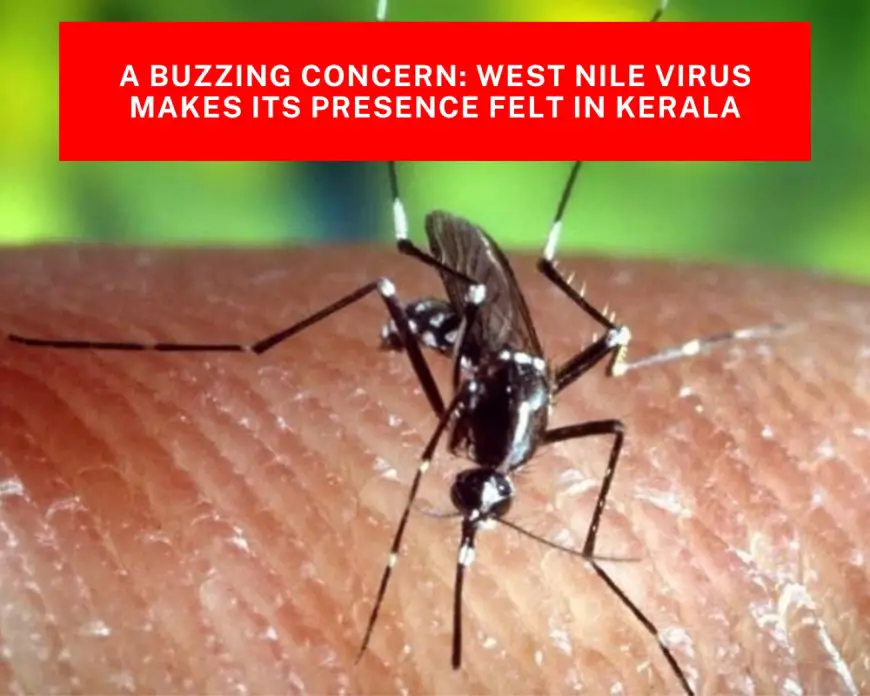A Buzzing Concern: West Nile Virus Makes its Presence Felt in Kerala
Kerala is on alert for West Nile virus, a mosquito-borne illness. Learn about the virus, its symptoms, prevention tips, and the latest updates on the situation in Kerala.

The beautiful state of Kerala in India is facing a public health concern with the recent rise in West Nile virus (WNV) cases. This mosquito-borne illness has caused worry among residents, and it's important to be informed about the virus, its transmission, and how to stay protected.
What is West Nile Virus?
West Nile virus is a single-stranded RNA virus belonging to the Flaviviridae family. It's closely related to the viruses that cause dengue fever, Japanese encephalitis, and yellow fever. The virus primarily circulates between birds and mosquitoes, with humans becoming accidental hosts when bitten by infected mosquitoes.
How Does West Nile Virus Spread?
Culex mosquitoes, commonly found in Kerala, are the primary carriers of WNV. These mosquitoes become infected by feeding on birds carrying the virus. Subsequently, when an infected mosquito bites a human, the virus can be transmitted. It's important to note that direct human-to-human transmission of WNV is extremely rare.
Symptoms of West Nile Virus
Thankfully, around 80% of people infected with WNV show no symptoms at all. However, for those who do develop symptoms, they can range from mild to severe. Here's a breakdown of what to watch out for:
- Mild Symptoms (Occur in 20% of cases): Fever, headache, body aches, nausea, vomiting, fatigue, skin rash.
- Severe Symptoms (Occur in less than 1% of cases): High fever, stiff neck, muscle weakness, confusion, paralysis, coma.
WNV in Kerala: Current Situation (as of May 11, 2024)
Recent reports indicate a rise in WNV cases in Kerala, particularly in the districts of Malappuram, Kozhikode, and Thrissur. There have been confirmed cases and suspected infections, prompting the state health department to issue advisories and ramp up preventive measures.
Staying Safe from West Nile Virus
While there's no specific vaccine available for WNV, there are effective ways to prevent mosquito bites and minimize the risk of infection:
- Reduce Mosquito Breeding Grounds: Eliminate stagnant water sources around your home, such as in old tires, flower pots, and clogged drains.
- Use Mosquito Repellents: Apply EPA-registered insect repellents containing DEET, picaridin, oil of lemon eucalyptus, or IR3535 to exposed skin.
- Wear Protective Clothing: Wear long-sleeved shirts and pants, especially during dusk and dawn when mosquitoes are most active.
- Use Mosquito Nets: Sleep under treated mosquito nets, especially if you live in an area with a high mosquito population.
Kerala's Response to WNV
The Kerala health department has taken proactive steps to address the WNV situation. These include:
- Public Awareness Campaigns: Educating residents about the virus, its symptoms, and preventive measures.
- Fogging and Insecticide Spraying: Targeting mosquito breeding grounds and implementing vector control measures.
- Enhanced Surveillance: Increasing testing and monitoring to track the spread of the virus.
Conclusion
West Nile virus presents a public health concern in Kerala. However, by staying informed about the virus, practicing preventive measures, and cooperating with public health initiatives, the risk of infection can be significantly reduced. Remember, early diagnosis and treatment can lead to a full recovery from WNV.
Stay vigilant, stay protected!
Additional Resources:
- World Health Organization: West Nile Virus
- Centers for Disease Control and Prevention: West Nile Virus








